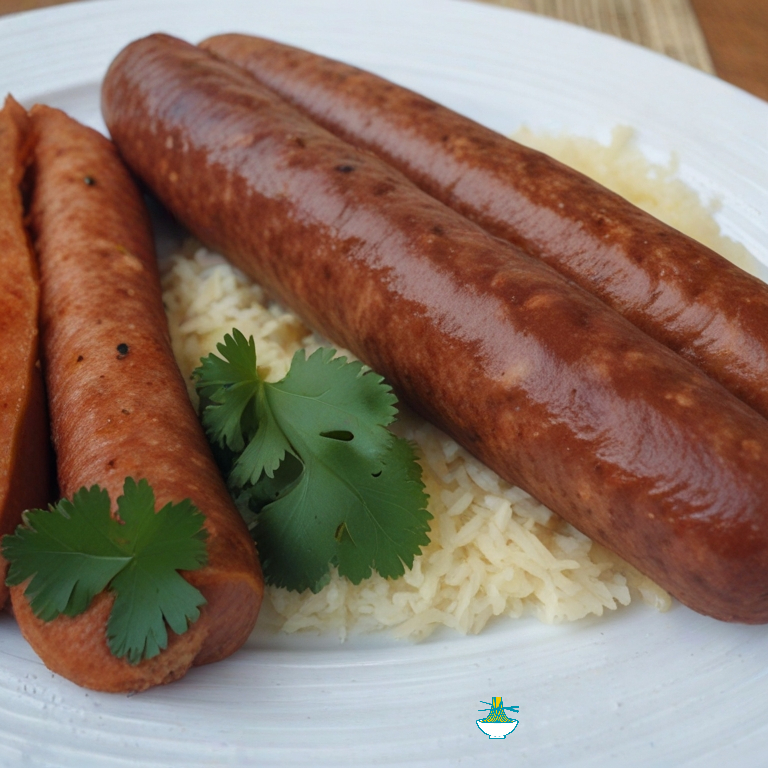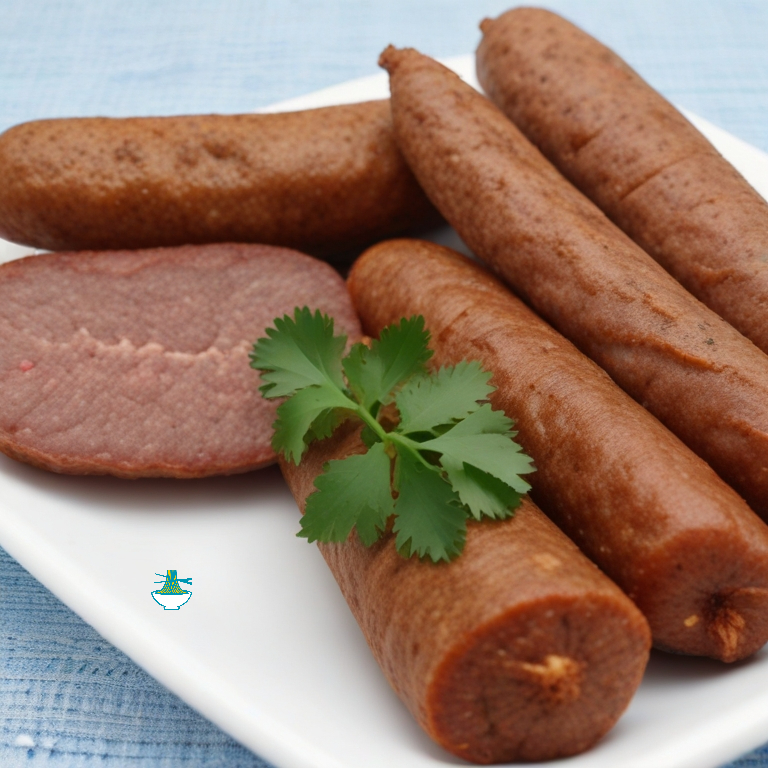The Lusu sausage is a beloved dish in Zambian cuisine, known for its robust flavors and cultural significance. This sausage, made from ground beef or pork mixed with a blend of spices like salt, black pepper, paprika, garlic powder, and onion powder, captures the essence of Zambian culinary heritage.
Historically, Lusu has deep roots in Zambian food traditions, often served during festive occasions and communal gatherings. Its preparation reflects the resourcefulness of Zambian cooks, who use simple ingredients to create a flavorful and satisfying dish.
Today, Lusu remains a popular choice for those seeking a taste of Zambia's rich culinary heritage. Whether grilled, pan-fried, or shaped into patties, Lusu delights the senses with its savory aroma and hearty flavor, making it a cherished part of Zambian cuisine.
Ingredients:
- 500g ground beef or pork
- 1 teaspoon salt
- 1 teaspoon black pepper
- 1 teaspoon paprika
- 1 teaspoon garlic powder
- 1 teaspoon onion powder
- 1/2 teaspoon cayenne pepper (optional, for spice)
- Sausage casings (if available, otherwise can be shaped into patties)
Method:
1. In a mixing bowl, combine the ground beef or pork with salt, black pepper, paprika, garlic powder, onion powder, and cayenne pepper (if using). Mix well until the spices are evenly distributed throughout the meat.
2. If using sausage casings, stuff the seasoned meat mixture into the casings, ensuring they are evenly filled. Twist or tie off the ends to secure the sausages.
3. If not using casings, shape the meat mixture into sausage patties.
4. Heat a grill or pan over medium heat and cook the sausages for about 5-6 minutes per side, or until fully cooked and browned on the outside.
5. Remove the sausages from the heat and let them rest for a few minutes before serving.
Nutrition Value:
1. 500g ground beef or pork:
- Calories: Approximately 1160 kcal (varies based on fat content)
- Carbohydrates: 0g
- Protein: Approximately 100g
- Fat: Approximately 80g
- Sodium: Varies (depending on seasoning and processing)
- Cholesterol: Varies (depending on fat content)
- Vitamins and minerals: Contains essential B vitamins (B12, niacin, riboflavin) and minerals like iron and zinc.
- Nutritional benefits: High-quality protein source, rich in iron and zinc for blood health and immunity support.
2. 1 teaspoon salt:
- Calories: 0 kcal
- Carbohydrates: 0g
- Protein: 0g
- Fat: 0g
- Sodium: Approximately 2300mg (recommended daily intake should be limited)
- Cholesterol: 0mg
- Nutritional benefits: Essential for flavor enhancement, but excessive intake can contribute to high blood pressure.
3. 1 teaspoon black pepper:
- Calories: 6 kcal
- Carbohydrates: 1.4g
- Protein: 0.3g
- Fat: 0.1g
- Sodium: 1mg
- Cholesterol: 0mg
- Vitamins and minerals: Contains small amounts of vitamin K and manganese.
- Nutritional benefits: Has antioxidant properties and may aid in digestion.
4. 1 teaspoon paprika:
- Calories: 6 kcal
- Carbohydrates: 1.2g
- Protein: 0.3g
- Fat: 0.2g
- Sodium: 1mg
- Cholesterol: 0mg
- Vitamins and minerals: Rich in vitamin A and contains vitamin E, vitamin B6, and iron.
- Nutritional benefits: Provides antioxidants and supports eye health and immunity.
5. 1 teaspoon garlic powder:
- Calories: 9 kcal
- Carbohydrates: 2g
- Protein: 0.4g
- Fat: 0g
- Sodium: 1mg
- Cholesterol: 0mg
- Vitamins and minerals: Contains vitamin C, vitamin B6, and manganese.
- Nutritional benefits: Known for potential immune-boosting properties and adds flavor without added fat.
6. 1 teaspoon onion powder:
- Calories: 8 kcal
- Carbohydrates: 2g
- Protein: 0.2g
- Fat: 0g
- Sodium: 1mg
- Cholesterol: 0mg
- Vitamins and minerals: Contains vitamin C, vitamin B6, and potassium.
- Nutritional benefits: Adds flavor and may have anti-inflammatory properties.
7. 1/2 teaspoon cayenne pepper (optional, for spice):
- Calories: 3 kcal
- Carbohydrates: 0.5g
- Protein: 0.1g
- Fat: 0.1g
- Sodium: 0mg
- Cholesterol: 0mg
- Vitamins and minerals: Contains vitamin A, vitamin C, and potassium.
- Nutritional benefits: May aid in metabolism and digestion, adds heat and flavor.
8. Sausage casings (if available, otherwise can be shaped into patties):
- Calories: Varies (negligible in small amounts)
- Carbohydrates: Varies (negligible in small amounts)
- Protein: Varies (negligible in small amounts)
- Fat: Varies (negligible in small amounts)
- Sodium: Varies (depending on processing and preservation)
- Cholesterol: Varies (depending on ingredients used)
- Nutritional benefits: Provides structure for sausages and adds a traditional touch to the dish.
These values are approximate and can vary based on specific ingredients and preparation methods.


Comments